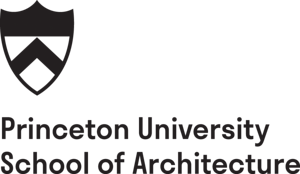Post-Professional M.Arch thesis exhibition
March 31–April 22, 2023
In the face of crisis, architecture has traditionally sought radical solutions. However, as a state of perpetual crisis becomes the status-quo, architecture must reevaluate its myopic narrative. The collective work of F(r)iction acts as transgressor rather than heroine. In responding to a myriad of environmental, sociological, and material issues, these projects strive to produce architectural fictions that argue for a nuanced form of spatialized agency. Their optimistic mode of working notwithstanding, these works also produce friction in our conventional cultural understandings. The work of F(r)iction proposes that architecture is the mediator situating us among the eddies of calamitous trajectories.
The eight projects exhibited are conducted in the context of the Post-Professional Graduate Program at Princeton University School of Architecture where there is a unique opportunity for professionally trained architects to return to the university to pursue a two-year program culminating in a year-long thesis. The 2023 Post-Professional M.Arch thesis class is coordinated by professor Jesse Reiser.
Nancy Ai: The Public Acclimation Station—Glendale
Advisor: Erin Besler
“Welcome to your Public Acclimation Station! We are a nation-wide network of stations dedicated to supporting your preparations amid the wildfire crisis.”
Shirley Chen: Working Interiors
Advisors: Stan Allen, Cameron Wu
Architecture participates in the construction of technology and its hidden interiors. By inventorying and reassembling the post-vacancy tech office, this thesis imagines the gig workers, who have been excluded from the tech work space, as its new occupants.
Xinyu Chen: A Seam(less) Construct
Advisors: Stan Allen, M. Christine Boyer
Seamless is a fusion of programs, a softening of the edge, an embracement of the advent of the hyper-real, and an exploration of technologically enhanced uncanniness to construct domesticity in a world with increasingly loose boundaries. This thesis proposes to investigate the instrumentality of images, to extend montage techniques from two-dimensional visuality into three-dimensional space-making. It uses meta-montage to understand culture, to storyboard, and to define a new way of living.
Andy Kim: Shape within Shape. Rewilding Brooklyn
Advisor: Michael Meredith
If the limitation of building mass through volume and density promised the infinite expansion of urbanism, then the limitation of urban green space must be designed to ensure its pervasive future. This thesis examines the proposition “shape within shape,” a logic that holds true of both the existence of the building and wildlife, where poetic imagination, ‘promise’ can be conceptualized for the diminishing urban ecology.
Danial Mahfoud: Three Corners
Advisors: Paul Lewis, Cameron Wu
Contemporary timber construction prioritizes the economy of mass production and the structural capacity of engineered timber, while maintaining a tenuous correlation to wood’s innate expressive and mechanical capacity, as well as its tectonic, spatial, and functional potential. By appropriating traditional interlocking wood joinery techniques in conjunction with the logic of massly produced sheet timber, it is possible to adapt a character of wood that conceives of a spatial and functional organization coincident with an expressive tectonic assembly.
Ana Morris: Refuse Grotto
Advisor: Jesse Reiser
The refuse grotto is an act of retroactive monumentality. It is a deviant architecture that requires confrontation with the sheer mass of wastes that are accumulated in landfills and cast to the peripheries of cities.
Ali Berk Senbas: The Paradox of Exterior Shelter: Perpetual Campfire and the Star
Advisors: Elizabeth Diller, Forrest Meggers
Departing from observation regarding seasonal changes, this thesis invents a new paradoxical condition for architecture—sheltering exterior, and searches for a solution to this paradox: the perpetual campfire (cooler).
Guanglei Zhang: Warm Cloud
Advisor: Jesse Reiser
Warm Cloud imagines a hybrid tactic to Dutch land reclamation through the harmonization of aeroponic farming and data hub’s organizational framework. The proposed aquatic infrastructure endeavors to infiltrate among the more-than-human agents and bond them into an open-ended distributed network, both geopolitically and informationally, serving as an artificial ground that integrates the fluid posthuman bodies into a synergistic whole.

